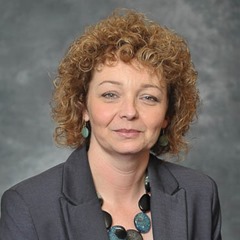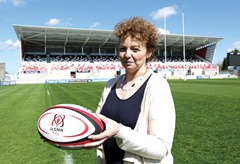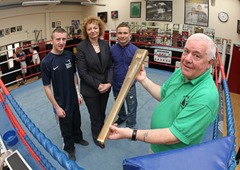A creative society
 Culture, Arts and Leisure Minister Carál Ní Chuilín highlights how sport benefits society and discusses the case for government investment in the arts with Peter Cheney.
Culture, Arts and Leisure Minister Carál Ní Chuilín highlights how sport benefits society and discusses the case for government investment in the arts with Peter Cheney.
Three years into her role as Minister, Carál Ní Chuilín is keen to highlight sport’s widespread benefits for society as well as its ability to promote Northern Ireland.
Sport is the highest profile priority in the remit of the Department of Culture, Arts and Leisure (DCAL) which also covers museums, libraries, languages, inland waterways and fisheries, and the Public Record Office. It also channels government support for the creative industries which include the arts, architecture, computer gaming, publishing, film and broadcasting.
“It’s one of those departments that you’ll certainly not get bored in,” Ní Chuilín remarks. “The variation’s quite good. Don’t get me wrong, I certainly enjoy sport and I enjoy a lot of aspects around the arts but certainly the variation, I think, keeps you on your toes.”
She also takes an interest in how the department’s public bodies work in communities. Libraries, for example, are “the heart of the community” especially in rural areas. The Minister is pleased to see libraries offering more than a book-lending service e.g. mental health advice and internet access for job seekers.
The interview took place just before the start of the Commonwealth Games and her main ambition is to see more people participating in sport and physical activity. In her view, the work of sporting clubs in deprived communities is “finally getting the recognition it deserves” after holding communities together for many years.
“I know in Belfast, just during the last week [up to 12 July], a lot of those sporting clubs along with community and voluntary groups provided diversionary activities for kids who live in vulnerable areas,” she explains. “Not only are they providing an activity that keeps vulnerable people out of the criminal justice system, they’re also keeping people fit and active and healthy and it also helps mental health as well.”
Ní Chuilín also takes pride in Northern Ireland’s high level of sporting talent. “This part of the island has more champions than, I think, any other part,” she comments.
It is put to her that perhaps too much has been invested in stadia rather than grassroots sport. Responding, she says that facilities were not fit for purpose for many years and the stadium capital funding only started in 2011.
The Minister points out that Ulster Rugby has used its new build at Ravenhill to develop relationships with the Cregagh estate and with schools which traditionally have not played the game. She adds: “They’re going to have hopefully more people participating in sport, so a better pool of people to pick from.”
Investments in Windsor Park, Casement Park and Ravenhill will be followed by a capital programme in local sports grounds after 2015. In the meantime, DCAL has given the Irish Football Association, Ulster GAA and Ulster Rugby additional money to improve participation in sport and the governing bodies have “delivered very well” on that priority.
The relationship between the three bodies is also “better than it was ever before” and she wants to see them sharing practice and experiences, whether good or bad, so that they can keep improving their sports.
However, when she took office, the Minister had been “shocked” at the poor facilities for boxing despite the sport yielding more medals for Ireland than any other sport. At the time, the boxing clubs had felt that she was being critical but her point was that they had “produced champions despite the facilities, not because of them.”
Ní Chuilín found the same trend across all sports but she praises Sport NI and governing bodies for supporting sports within deprived areas and using them as a “catalyst” for less offending, better mental health, more participation, and also the development of potential athletes. They are also meeting the challenge of bringing more women and disabled people into sport.
“We have a reputation for sporting excellence unlike any other,” she continues, pointing to the region’s well known golfers, boxers, rowers, and track and field athletes. The Minister is reluctant to highlight any particular sport success story: “To be fair to them all, I think they’re all doing a good job at times under very difficult circumstances.”
Up to the next Assembly election, she wants to invest more money in grassroots sport and also encourage public bodies to reach out to more people. Last December, for example, the Arts Council subsidised tickets for theatres so that they could attract people who had never been to those venues before.
Ní Chuilín adds: “They brought people into those theatres who had never been to a pantomime or to a play or a show, and I know – because they’ve seen the success of that – that that’s the direction of travel that they want to concentrate on but it does need investment.”
Local film, television and radio production has received global recognition – she’s keen to point out that this is not limited to Game of Thrones – and the Minister wants to put support for creative industries on a more secure footing. Other priorities include making sure that culture can contribute to tolerance and respect and continuing the capital investment in sport.
DCAL’s budget for 2014-2015 totals £182 million: £104 million for current expenditure and £78 million for capital expenditure. There is, though, a debate about whether government should fund the arts. Advocates of small government, especially in the USA, oppose funding for the arts and claim that this is an unnecessary intervention by the state.
“I don’t agree with most of what comes out of America, let’s be frank about that,” Ní Chuilín says in response. She sees a society which “claims to be tolerant [but] is really intolerant particularly around government subsidy – and without intervention you’re going to have [an] élite.”
If the state does not play its part, the gap between aspiration and the élite is “going to be so huge that you’re going to end up demoralising some very creative people.” The Section 75 equality duty in the Northern Ireland Act requires the state to distribute funding across a range of social groups.
The Minister adds that public bodies and arts organisations have spent their funding “very wisely”. She acknowledges that creativity comes from the individual but adds: “You can’t expect someone to be creative [and] to build a theatre, it’s not fair on them.” As for theatres built before government funding was available, Ní Chuilín says that this was “elitism” and the benefits were not shared fairly.
Investment in the arts also includes investing in mental and physical well-being, regeneration and the wider economy. She concludes: “I think the arts community are providing a great public service.”
Profile: Carál Ní Chuilín
Carál Ní Chuilín was a councillor for Oldpark on Belfast City Council (2005-2007) before being elected to the Assembly in 2007. She was the party’s Chief Whip in the Assembly term and has been Minister of Culture, Arts and Leisure since May 2011. Carál holds a BSc in social studies and a masters in management and previously worked with the Tar Anall ex-prisoner group.
With a strong interest in music, she has a “vast playlist” on her iPad: “You find anything there from Led Zeppelin to Bach.” She would rather be at a concert than anywhere else and also likes walking and socialising. Married with three children and two grandchildren, she is part of the Skype generation and enjoys keeping in touch with her son in the USA.







